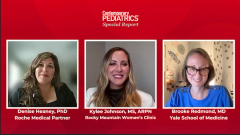
Special Report: Future Directions for STI Diagnosis and Treatment
Explore how family-centered care and early intervention in STI prevention can transform pediatric health outcomes for future generations.
Episodes in this series

In the final segment of our 7-part Special Report, the conversation underscores how prevention is family-centered care. Whether it’s syphilis, HIV, or hepatitis B, the ability to detect and intervene early—often before a newborn ever shows signs—can mean the difference between a NICU admission and a healthy baby rooming with their mother.
What excites us most about the future is the possibility of diagnosing earlier, intervening sooner, and ultimately preventing conditions that once carried life-long consequences. Expanded treatment options, more accessible diagnostics, and cross-disciplinary collaboration all serve one purpose: giving children the healthiest possible start in life.
Still, the burden doesn’t end in the delivery room. Adolescents are a vulnerable group, and empowering families to accept screening, understand results, and follow through with care is just as critical as the science itself. Pediatricians are uniquely positioned to act as trusted messengers—bridging evidence-based guidelines with real family concerns and countering misinformation.
The future of sexually transmitted infections (STI) prevention in pediatrics depends on this partnership: providers equipped with better diagnostics, and families empowered with knowledge. If we meet both of those goals, we won’t just reduce infection rates—we will improve the health trajectories of entire generations.
Our Experts:
- Kylee Johnson, MS, APRN, is a women’s health nurse practitioner at Rocky Mountain Women's Clinic.
- Brooke Redmond, MD, is an attending neonatal critical care physician at the Yale New Haven Children’s Hospital. She is the creator and director of the 24/7 BABY program.
- Denise Heaney, PhD, is a senior scientific affairs manager in Diagnostics Information Solutions at Roche Diagnostics Corporation in Indianapolis.
Redmond and Johnson have no relevant disclosures to report. Relevant disclosures for Heaney include Roche.
References:
Hufstetler K, Llata E, Miele K, Quilter LAS. Clinical Updates in Sexually Transmitted Infections, 2024. J Womens Health (Larchmt). 2024;33(6):827-837. doi:10.1089/jwh.2024.0367
World Health Organization. Guidelines for the management of asymptomatic sexually transmitted infections. Published 2025. Accessed September 30, 2025.
https://www.ncbi.nlm.nih.gov/books/NBK616637/
Newsletter
Access practical, evidence-based guidance to support better care for our youngest patients. Join our email list for the latest clinical updates.







